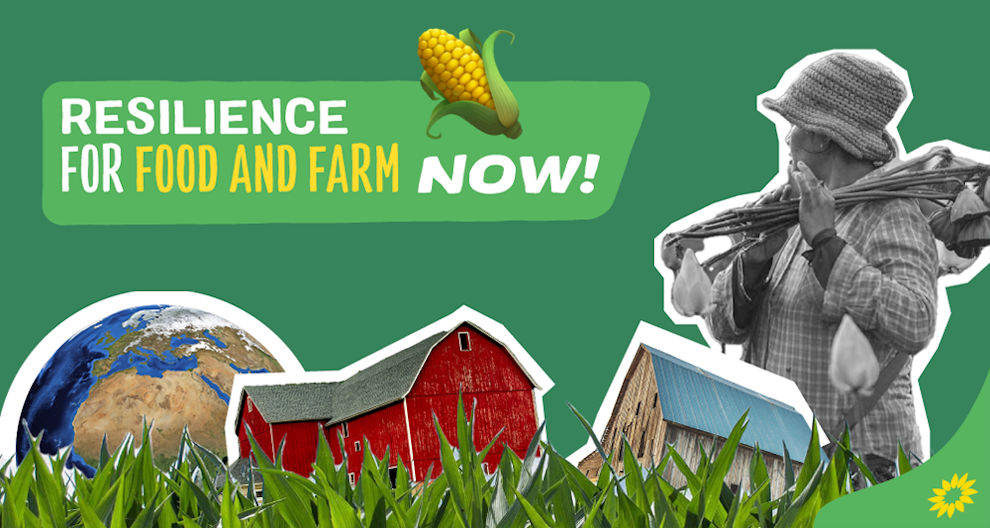We are facing a year of catastrophic hunger in 2022. Our food systems have not only been impacted by the climate crisis and the COVID-19 pandemic but is now under attack due to Putin's war in Ukraine.
Together, Russia and Ukraine exported more than a quarter of the world's wheat before the war. Two thirds of Ukraine is 'black earth', one of the most fertile soils in the world. Now, not only are Ukrainians facing a food crisis, but the war is also impacting food security across the globe. Global wheat prices are skyrocketing everywhere.
As a global food crisis is developing, Putin has landlocked Ukraine, bombed grain warehouses and blocked Black Sea Port exports – a major gateway for grain shipments. According to the United Nation's World Food Programme's executive directors, Putin's weaponisation of world food supplies is a "declaration of war on global food security." The European Union also called out Putin for "using hunger and grain to wield power."
Meanwhile, food is faced with critical challenges as climate shocks continue to rock those on the frontlines of the climate crisis. The UN has already warned that food production must change to prevent and mitigate the worst effects of global warming. Climate catastrophes such as recent heatwaves causing droughts and floods that have already had a catastrophic impact on people, crops and cattle.
There is enough food to feed everyone, but unequal access and inefficient handling leaves many without. Today, part of the issue is that the majority EU crops are used to produce 'biofuel' and feed animals, which means less grains for human consumption. All crops should be saved for people, not for animal feed, biofuels or wasted.
A Green vision on food security
Food security means a climate-resilient, adaptable agricultural system that feeds everyone and is fair to farmers and workers. How our food is produced also has a major impact on our climate commitments. As Greens, we strongly believe that climate protection and food security should and can go hand in hand.
The intensification of agriculture pushed by the agribusiness industry is accelerating the loss of healthy soil, biodiversity, and natural areas. Without a shift to sustainable agriculture, we will run into an even more dire food crisis in the long term. The UN's Intergovernmental Panel on Climate Change (IPCC) report shows that by 2100, one third of the world's food supply will be lost. Only a holistic, diverse and small-scale food system rooted in ecology can feed us safely and reliably.
The Greens/EFA group in the European Parliament have made clear that a Green Deal that centres climate and farmers is essential for our climate commitments and food security. The war in Ukraine and its geopolitical repercussions should be a reason to strengthen the Farm to Fork and Biodiversity strategies, as they are crucial to the future and the sustainability and security of our food system. But at the outset of the war, detractors such as the Czech president stated we should 'forget about the Farm to Fork strategy for a few months'. This is the wrong answer to the crisis we are facing. We cannot roll back agricultural and environmental policies to benefit agribusinesses over citizens!
Instead, we need to invest in small farmers to get us out of the food crisis. In the short term, the Greens/EFA group in the European Parliament is calling for less feed for animals and more food for people, no grains for biofuels, stopping food waste, and taxing big corporations profiting from the crisis. Next year, as the Green Deal focuses on sustainable food systems, it will be a crucial moment to keep pushing for more ambition. Thomas Waitz, Green MEP and Co-Chair of the European Greens, is dedicated to the fight for sustainable agriculture. He states:
"We must not backtrack progress made on the Green Deal. Our response to the war in Ukraine and the global food crisis are agro-ecological farming practices. They help us fight the climate and biodiversity crises while securing short and long-term quality food supply. We must focus on more sustainable agriculture everywhere and tackling the climate crisis that is endangering farmland across the world."
In Germany, Annalena Baerbock, Foreign Policy Minister and former Co-Chair of the German Greens, announced that 3.8 billion euros will be provided for food security this year, as part of a new alliance for global food security initiated by the German G7 presidency. She also emphasises that it is critical to tackle the impacts of the climate crisis: "We must help farmers to become less vulnerable to droughts, floods or extreme rainfall." The German G7 presidency has also initiated a new alliance for global food security, which will work on establishing solidarity routes and increasing funding to food insecure communities. Tilly Metz, Green MEP, also joined the mission of the agriculture committee to the Polish and Ukrainian border. She emphasised that we need to step up our efforts to save Ukrainian grain.
If we really want to help save the harvests in #Ukraine 🌾, the EU needs to think bigger:
The solidarity lanes should go from inside 🇺🇦 to their final destination, especially to the countries outside 🇪🇺 which really depend on these imports!
My speech 👉🏼 https://t.co/p9YsEbsP5m pic.twitter.com/sjx3XYqZbw— Tilly Metz MEP (@MetzTilly) July 6, 2022
As Greens, we believe that food should never be used as a geopolitical weapon – and we should never be in the position for it to be used against us. We call to increase food aid and humanitarian assistance for Ukraine and other vulnerable populations across the EU, and make sure that solidarity lanes go from Ukraine to their destination. To ensure food security in the long-term, we must make the shift towards sustainable and resilient agriculture.
